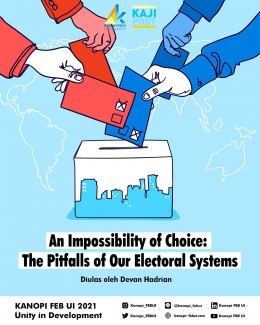Cherishing Democracy
As meticulously crafted and well-thought out these theorems might be, they still stand atop one of the most widely used pillars of sand in economics: the assumption that everyone will act rationally. For most of us who don't really engage that much in politics, we would probably just vote according to our preferences without considering strategy, and the problem of strategic voting becomes one of less importance. Instead, the problems we encounter with elections are mostly technical problems, such as accessibility, ease of voting, and susceptibility to various forms of fraud. It is more important to address such problems first before we even try to systematically improve our elections.
At the end of the day, democracy is not perfect. Some say that the voice of the people is the voice of God, but most of the time we don't know what the people's voice is. However, that shouldn't stop us from going to the polling place and casting our votes for our favourite candidate. Even with all its flaws, democracy and elections are still the best ways to distribute political power among the people. So go out, vote, and celebrate democracy with all its shortcomings. After all, it's certainly better than being under a dictatorship, right?
Diulas oleh: Devan Hadrian | Ilmu Ekonomi 2020 | Staf Divisi Kajian Kanopi FEB UI 2021
REFERENCES
ACE Electoral Knowledge Network. (2021). Electoral Systems. Retrieved from https://aceproject.org/ace-en/topics/es/
Arrow, K. J. (1963). Social Choice and Individual Values. Yale University Press. ISBN 978-0300013641.
Condorcet, N. d. (1785). Essai sur l'application de l'analyse la probabilit des dcisions: Rendues la pluralit des voix. Paris: De l'Impremiere Royale. Retrieved from https://gallica.bnf.fr/ark:/12148/bpt6k417181
Myatt, D. P. (2007). On the Theory of Strategic Voting. The Review of Economic Studies, 74(1), 255--281. Retrieved from http://www.jstor.org/stable/4123244
Primer. (2020, November 1.) Simulating alternate voting systems. YouTube. Retrieved from https://youtu.be/yhO6jfHPFQU
Baca konten-konten menarik Kompasiana langsung dari smartphone kamu. Follow channel WhatsApp Kompasiana sekarang di sini: https://whatsapp.com/channel/0029VaYjYaL4Spk7WflFYJ2H







